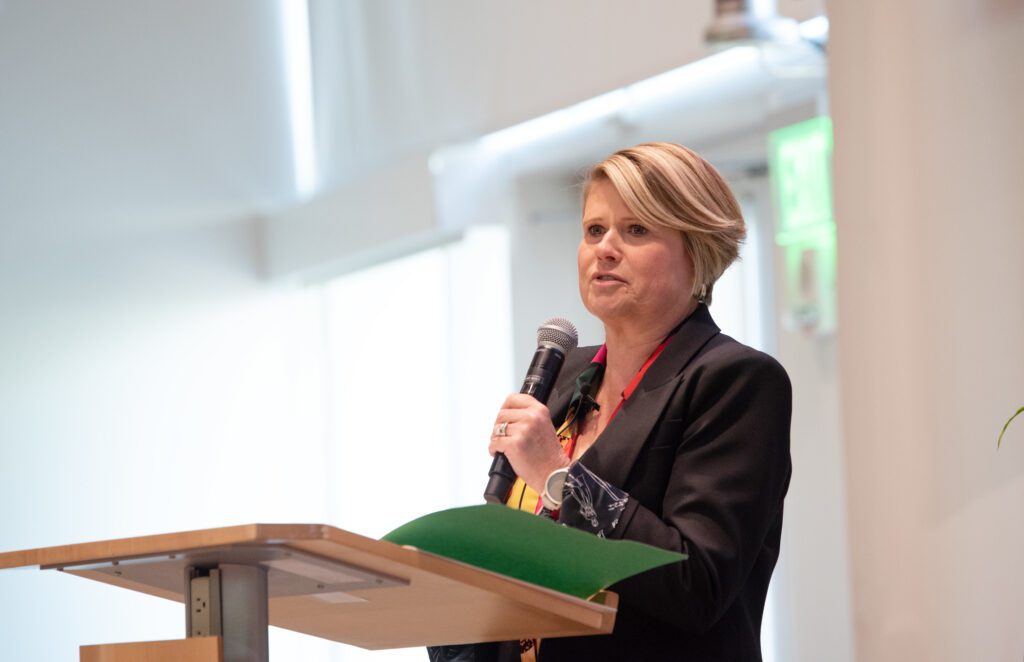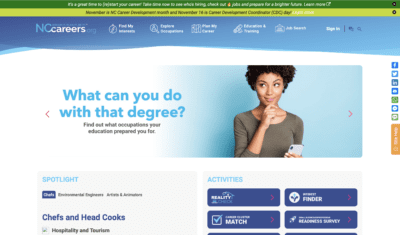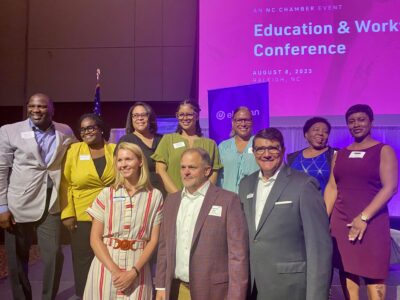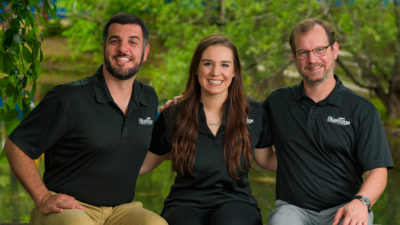
|
|
More than 150 K-12 education leaders from across North Carolina convened in Durham on April 23 for the Department of Public Instruction’s (DPI) first career planning success summit.
The event — which included representation from each of the state’s eight regions and 25 school districts — focused on the future development of student success career initiatives across the state. Attendees heard from education stakeholders, business leaders, and students themselves about career planning strategies that work.
“What you’re doing today is so important,” said state Superintendent Catherine Truitt. “The earlier that we can get students engaged in career exploration, the more likely they are to find a pathway that interests them, that will engage their natural aptitudes, and lead to a family sustaining career.”
Attending a four-year college directly after high school is not for everyone, Truitt said. Instead, DPI is pushing more schools to push the “three E’s” students can pursue after graduation: Enroll, Employ, or Enlist.
However, Truitt said postsecondary credentials can accompany each option. Among other things, students can enroll in a two-year associate program at a community college, earn a technical or apprenticeship certificate, or take college classes while in the military.
Throughout the convening, speakers said highlighting all post-graduation pathways is crucial to meeting the state’s workforce needs and educational attainment goal.
“It’s critical for us to start talking to young people about your postsecondary plan, and whatever post econdary education you’re gonna get after school,” Caroline Sullivan, executive director of the North Carolina Business Committee for Education (NCBCE), told EdNC. “… All of these things are postsecondary education — it just is a different way to get it.”
U.S. Army Recruiter Lt. Col. Ramon Ramos highlighted the need to expose students to different pathways.
During his presentation, Ramos asked attendees to first raise their hands if they attended college. Most hands in the room went up.
Next, he asked people to keep their hands raised if they went to college knowing what they wanted to do — and if they still work in that career. Roughly half of the hands across the room fell.
Finally, he asked how many people pursued what they wanted to do in high school. A smattering of hands remained up, including Ramos’. He said many students who enroll in the military after high school long knew that was what they wanted to do, often due to family members in the military.
Truitt said it is crucial that all students have access to knowledge about pathways beyond going to a four-year college. That’s part of the reason why DPI developed a K-12 Workforce Toolkit, which is meant to help parents and students learn more about career pathways available to them during their educational journey.
“Students have to see it to know that they can do it,” she said.

The importance of partnerships
Reno Palombit, director of Career & Technical Education (CTE) at Johnston County Public Schools, spoke with attendees about the district’s career planning efforts.
Johnston County Schools partnered with Xello with the goal of creating electronic Career Development Plans (CDP) for every student. According to the district’s website, Xello includes career readiness lessons, career interest assessments, personal goal setting, career planning, career and college research, financial aid information, job descriptions, job growth, salary expectations, and high school planning.
“I do think we are leaders in this and we have done a lot of work, but we still have more to do,” Palombit said.
Last year, Palombit said there was a 60% CDP completion rate across the district, with higher rates at the middle school level. He stressed the importance of partnerships in completing CDPs and providing further career exploration opportunities for students.
“You can’t do this alone,” Palombit said. “We rely on business and community partners to make this happen.”
NCBCE’s Sullivan echoed that sentiment.
As the state works to increase postsecondary attainment, she said it’s important that good work does not stay siloed in separate areas and industries.
“Making sure students have the opportunities to access the postsecondary educational path that they’re choosing takes partnerships, because it doesn’t belong in just one place,” she said. “We’re all responsible for them.”
Sullivan said the NCBCE has heard for a long time from local employers that they don’t know how to get involved in schools. In other words, she said, there is often a disconnect between systems.
“But there are a lot of ways we have made it quite easy,” she said.
In February, for example, DPI and the N.C. Chamber published a toolkit to help businesses establish partnerships with public schools across North Carolina.
The toolkit is a follow-up to DPI’s 2022 launch of “The Year of the Workforce,” which included the the development of four workforce goals and publication of a workforce development website. It includes specific examples of business-school collaboration across all school levels, among other things.
The NCBCE also developed the Navigator, which is provided at no cost to educators and employers and designed to connect classroom learning to career pathways.
“Through this platform employers post work-based learning engagement and information opportunities like career profiles, guest speakers, internships, and pre-apprenticeships. Educators can search for, request, and track their engagement through the platform,” says the Navigator.
Finally, the state also developed a comprehensive state career database, NCcareers.org.
Student panel on career exploration
The summit also included a panel featuring students who each opted for slightly different postsecondary paths:
- Henesy Gloria-Bejar is a graduate of the Southern School of Energy and Sustainability. She works as a human resources specialist in the U.S. Army and plans to take college classes part-time next year.
- Tyler Hulin is a 2020 graduate of Randleman High School. He is in his fourth year of an apprenticeship at United Brass Works.
- Alex Holt is a senior at Riverside High School in the engineering pathway. He is an apprentice in the North Carolina Triangle Apprenticeship Program (NCTAP).
- Shiro Zyrah Ndirangu is a senior at Wake Young Women’s Leadership Academy. She is committed to attend UNC-Charlotte in the fall.
A common theme among panelists was the impact of educators during their decision-making.


Zyrah Ndirangu said attending an early college helped her develop many career skills in her college classes. Having a smaller class size also meant she was able to receive more attention and help from teachers and counselors.
Zyrah Ndirangu credits her former assistant principal for helping her decide she wanted to attend UNC-Charlotte to study finance.
“If not for her… I think I would have underestimated myself in many ways,” she said. “And she did not allow me to do that.”
Gloria-Bejar said she began thinking about the military when she realized she needed help paying to attend school to study business and real estate.
After learning about the education benefits involved in enrolling in the U.S. Reserves, she emailed her school’s recruiter. “He called me, like, as soon as I sent it to him,” she said.
Her school counselor also helped her make a decision she felt confident about, even doing research to help her.
“Since my junior year, he’s been really attentive,” she said.
Panelists also spoke about the importance of being exposed to different pathways.
Hulin, who will graduate from his apprenticeship in August, plans to then start an online engineering bachelor’s degree through his company. He discovered metal working as a career option after telling a counselor he liked doing hands-on work.
“It really helped to have that class and expose myself to that field, because I would’ve never known about that field if I hadn’t taken that class,” he said. “I think exposure is everything.”
Holt, also an apprentice, said he quickly realized he did not want to sit in a college classroom for four years after high school.
The engineering pathway at his school set him up with multiple tours to figure out what apprenticeship he was interested in.
“It seems like, these days, it’s kind of just expected that high school students will go to college, and that’s all there is,” Holt said. “If I hadn’t gone to Riverside’s engineering program, I don’t think I would have figured out about this apprenticeship that I’m going into.”

What’s next?
The 2023 budget directed the State Board of Education to develop standards for a new career pathways course in middle school.
That course will help meet another new requirement, which requires seventh graders to develop career development plans in order to move to the next grade level. In 10th grade, students must revise that plan to move to the next grade.
The Board had to pick at least 20 local school administrative units to pilot the career development plan requirements during the 2023-24 year. Then, the budget said, the state will implement the full plan in 2024-25.
The budget also directed the Board to create a three-year graduation track for high school students that will go into effect during the 2024-25 school year.
“It’s becoming more and more important, as things grow and change due to technology, that we make things as flexible as we can for young people,” Truitt said at the summit regarding the three-year track.
This summer, DPI is also set to release the first set of performance tasks for the N.C. Portrait of a Graduate, which is designed to ensure that students are equipped with in-demand durable skills upon graduation.
The career planning summit concluded with an activity to help attendees create an “asset map” of partnership possibilities in their region.
Several tables proposed school partnerships with local businesses, such as poultry plant Mountaire Farms in Siler City. The table said that partnership might include a tour of the facility, education about agriculture and supply chain management, and entrepreneurship opportunities.
Two other tables proposed partnerships with local health care facilities, like mapping out career opportunities at the local hospital or expanding CTE health science partnerships at a long-term care facility.
Here are the some of the other partnership ideas tables came up with:
- Public libraries, which could offer volunteer opportunities for students. This could include summer and after-school programs to engage parents and let them know about career opportunities.
- Civic organizations, like a rotary club. Especially in rural areas, these organizations could help “bridge generation gaps,” the table said, through mentorship, scholarships, and soft skill development.
- Local media, by providing media literacy workshops, media etiquette, and teaching students writing skills, filmmaking, etc.
- School alumni, to talk about their journey senior year and after graduation.
- Municipal city government, to offer career fairs, employment opportunities, guest speakers, and possibly creating summer job opportunities.
- Chambers of Commerce, to host networking events. One specific idea included hosting a series of “speed-dating” events around career clusters of interest, for students to practice soft skills and learn about what careers interest them.
After sharing out their ideas, tables created a deck of cards for each region of the state. Each regional deck went to a myFutureNC representative, in order to try to keep track of the ideas.
“Think of the collective power of your decks right now,” said summit facilitator Dan Gonzales, the president and CEO of District C, which offers a “reimagined internship experience.”
NCBCE’s Sullivan said collaboration between and within school districts and businesses is crucial to future career planning initiatives.
“Everybody’s a piece of the solution,” she said.








